The Derry minor football team of 2000 were the eleventh in the county’s history to win the Ulster title. Two of their number were Claudy’s Gavin Donaghy and Ogra Colmcille’s Chris Collins, two men now living nine thousand miles apart, but with shared memories about a dramatic year at the turn of the century.
*****
Somewhere along the line everything about the management of a successful GAA team changed. Not an abrupt off-a-cliff change, but a quiet revolution embedded within a burgeoning information age.
Like a precise definition of the term ‘Millennials’ (also known as Generation Y), the timing of the change in the approach to the preparations of top sports teams, from the traditional manager-led dictatorial environment, to a culture-based player-driven one, is hard to pin point.
What’s generally accepted though is that the All-Blacks were pioneers. Faced with humiliation following the 2003 World Cup, a new management team under Graham Henry set about building the world’s most successful sporting team, whose culture, described in James Kerr’s book ‘Legacy’, is now the bible for many businesses and sports teams worldwide.
So, for purposes of the narrative, we’ll call it 2004: the year of the change; a year when Mary McAleese was elected to a second term as Irish president, £26 million went missing from the Northern Bank in Belfast, and Gavin Donaghy and the Derry senior footballers faced Kerry in the All-Ireland semi-final at Croke Park.
“That back door run certainly threw up a couple of teams and venues Derry wouldn’t be overly familiar with,” says Donaghy, now a design engineer with Aerison in Western Perth, Australia.
Wicklow, Cavan, Wexford and beaten Munster finalists Limerick were overcome along a path that took Donaghy and Derry back to Croke Park for a quarter-final encounter with Páidí Ó Sé’s Westmeath outfit, fresh from making their own mark by winning the Leinster championship for the first time in their history.
“The Derry support was fantastic that day,” he recalls. “Muldoon’s goal was one of the highlights of the year and something I remember well to this day”.
Two stunning first half goals from Enda Muldoon and Paddy Bradley put Mickey Moran’s young Derry team onto a platform that they weren’t shaken from, despite huge pressure from the Midlanders in the second half.
Introduced as a substitute for Conleth Moran in the fifty-sixth minute, Gavin Donaghy made his return to Croke Park, the stage he had played on just four years previous, in a game which featured one of the biggest talking points of the Minor Championship of 2000.
*****
Sandstorm by Darude was the anthem of the Derry minors of 2000. You’ll know it if you hear it. It’s a tune that spawned hundreds of memes, a lyrically redundant high tempo number that reverberated on repeat around the team bus as it made its way to Breffni Park for the championship opener. One can only imagine what the team’s manager, Chris Brown, thought of it.
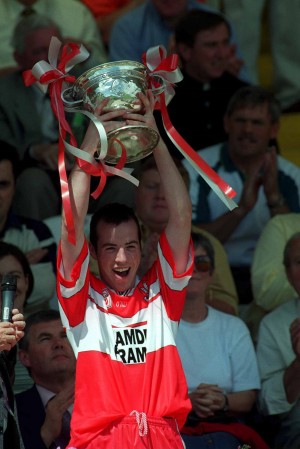
David Maher/SPORTSFILE
Still, it did the job in a game where inches can often define destiny. Call it luck, inspiration or character, but with Derry two points down, and with only seconds remaining and the Oakleafers facing an early exit, Gavin Donaghy’s high ball into the square was punched into the net by his older brother, Marty.
“Inches either way and our team would have been forgotten,” remarks Donaghy.
Cavan dreams were cruelly shattered in that instant but Derry’s beat would play on towards Casement Park where Down were dispatched amid a memorable performance by the team’s captain.
“Seán McKenna’s job that day on Benny Coulter was something else,” recalls Donaghy.
The Glen man formed a formidable half back line with his club mate Gary McMaster on the opposite wing and Chris Collins at number six.
It was a number which had always held special significance for the young lad from Ogra Colmcille.
“Playing in the playground at primary school I always wanted to be Henry Downey. In fact, that was the reason I went to the Convent, because Henry taught there,” laughs Collins about the school he would later captain in MacRory Cup campaigns.
Playing centre half back at only 16 years of age for Derry minors in 1999, in a team containing future senior stars like Fergal Doherty, Kevin McGuckin and Paddy Bradley, Collins was grateful for the encouragement dished out by the older heads.
“I remember training at Bellaghy prior to the Ulster semi-final against Donegal. Baker (Liam Bradley) told me I was starting. I wasn’t sure what to think but I recall Kevin pulling me to one side and telling me that if Baker thinks you’re good enough to start, then you are. I took great encouragement from that,” he says.
Having been selected to represent Ireland in an U17 international game against Australia – one of two brothers to do so, with all three boys representing the county at minor level – Collins looks back on his second of three years (in 2000) with Derry minors with fond memories, and yet also a sense of what might have been.
“That was a very strong group,” he recalls of the minors of the millennial team. “It’s similar to the current team (of 2017) in some ways. We had a couple of Drumsurn lads in Damien Canning and Colm Feeney. You have Tiernan McHugh and Dara Rafferty there this year so there’s a similar feel to it.
“Jim Kelly and Ciaran O’Neill were really top drawer forwards as well,” claims Collins. “They were as good as anyone in the country at that age group at that time.”
Managed by a team headed by Chris Brown that included the future Derry senior manager, Paddy Crozier, Collins feels that the direction given to the young players was one of the reasons for their success.
“Chris Brown was definitely ahead of his time now you look back. He had a relatively large group of people in the management who all knew their own respective roles and who carried them out efficiently, and without fuss,” he claims. “Ann Boylan was our physio and whilst there wasn’t the same emphasis on strength and conditioning and analysis that there is now, everything else was in place.”
“We beat a Tyrone team in that Ulster final that featured the likes of Seán Cavanagh, Peter Donnelly and Martin Penrose. Cormac O’Neill and Paul Young hit goals that day and Ciaran O’Neill from Glen was brilliant at centre forward. I actually missed that game due to a broken jaw I got in a club game! They got the better of us the following year and went on to win that All-Ireland so it was all very close and competitive.”
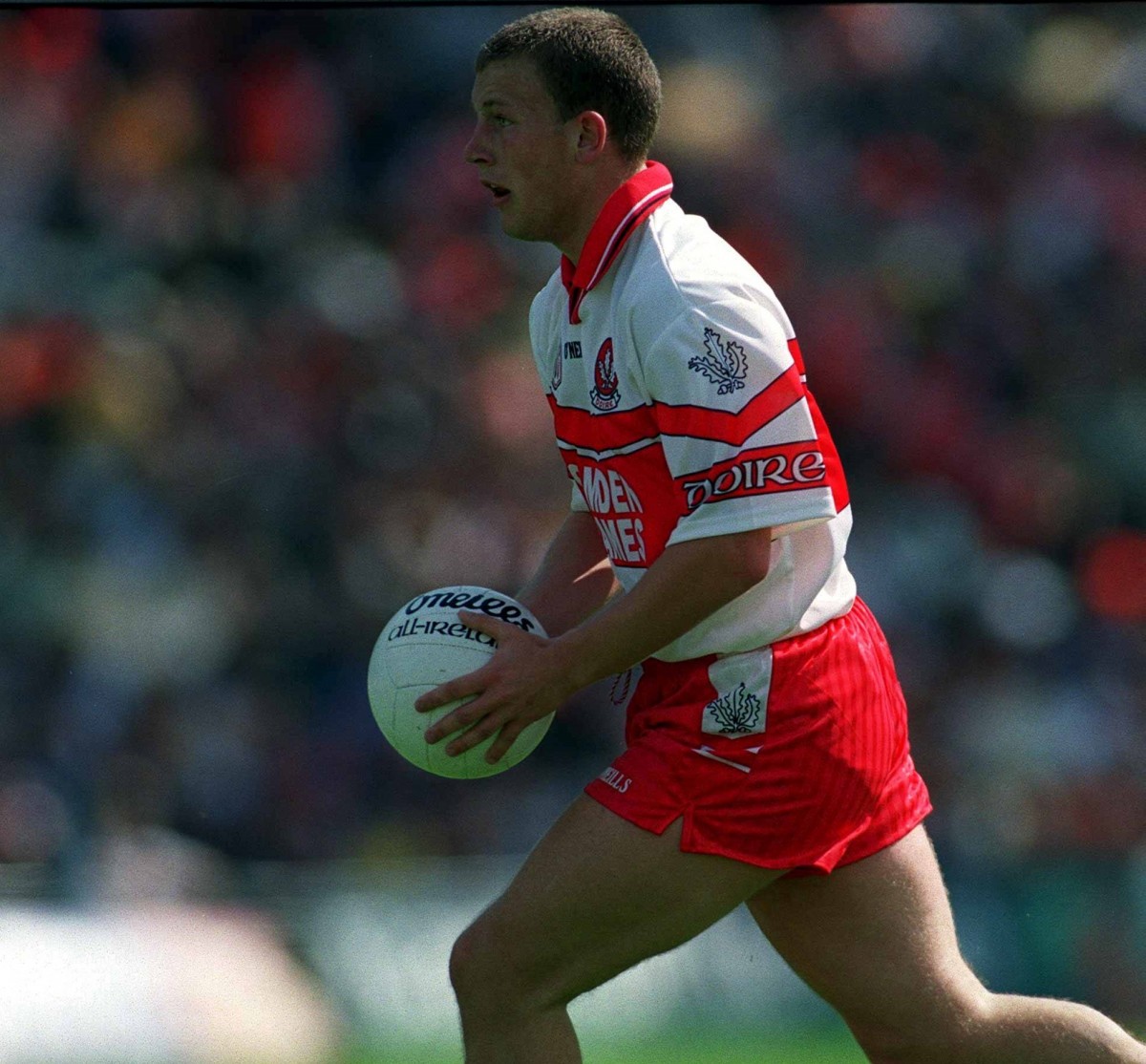
Aoife Rice/SPORTSFILE
The end of Collins’ intercounty career, cut short due to serious injury, was ‘one of the biggest losses to Derry football at that time’, recalled Paddy Crozier a number of years later. A degenerative condition in his right knee – his strongest kicking side – not only finished Collins at intercounty level, it left a legacy which still remains today.
“It just locks out,” he explains. “The pain is immense. It only happens once or twice a year. The last time it happened I think I fainted on the kitchen floor. The result back then was that I could never get that sustained period of conditioning under my belt that was needed to get to the next level. The consultant I was seeing suggested that I take up cycling as the impact on the knee wasn’t as aggressive. I’d still cycle fairly often yet,” he concludes.
Derry’s loss would soon become Derry’s gain though, as following a sports degree course at UUJ with a couple of summers ‘running around’ the New Jersey coast, Collins was appointed Games Development Manager (GDM) amid changes to the GAA’s coaching landscape across Ulster. He was just 22 but already the days of Derry minors seemed a distant memory.
“There were no real support structures for young players at the time,” remarks Collins. “Once the minor campaign was over that was basically it. It’s something that has gotten a lot better in recent years but there’s still more work to do in that area,” says Collins, now into his twelfth year as GDM.
“There’s been a lot of hard work over many years now at grassroots, schools and county level and it’s good to see our minors now back in Ulster finals and in Croke Park. We’ve done that consistently now over the past three years and whilst it’s unrealistic to expect that success in every single year due to the nature of knock-out football and how competitive Ulster is, Derry looks to be headed in the right direction at underage for the near term at least.”
Collins is adamant that the years spent developing relationships with clubs and schools, and outside of the county at provincial and national levels, is the key to progress at all aspects of Gaelic games.
“That’s something we’ve worked very hard at,” he states. “I’d be in favour of a hands-off model of management for sure,” he explains in relation to the coaching staff he now manages. “We recruit good people, we give them a job to do and we let them get on with it.”
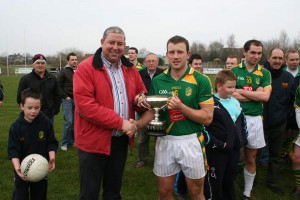
Of course, managing professional relationships to further the GAA in the county isn’t his only outlook. Collins and Donaghy, team-mates from 2000, still keep in regular contact across continents. Seventeen years may have flown by – separating the Derry minors by thousands of miles – but the electronic world has increased levels of communication exponentially during the same period.
The mother of all phones, the Nokia 3310, is now regarded as a cult item, but was state-of-the-art back at the turn of the millennium. The ability to use the internet as a primary source of information has changed the way that current generations not only interact, but in some ways how they think.
The rise of the use of WhatsApp and other messaging media has changed how groups communicate. How teams interact. In a lot of cases even language has been made follow suit.
Need information about sports psychology? Google it.
Strength and conditioning? Google it.
Young players are increasingly well educated in what goes into the makeup of a successful athlete meaning that even the most well informed coaches and managers must constantly stay ahead of the curve.
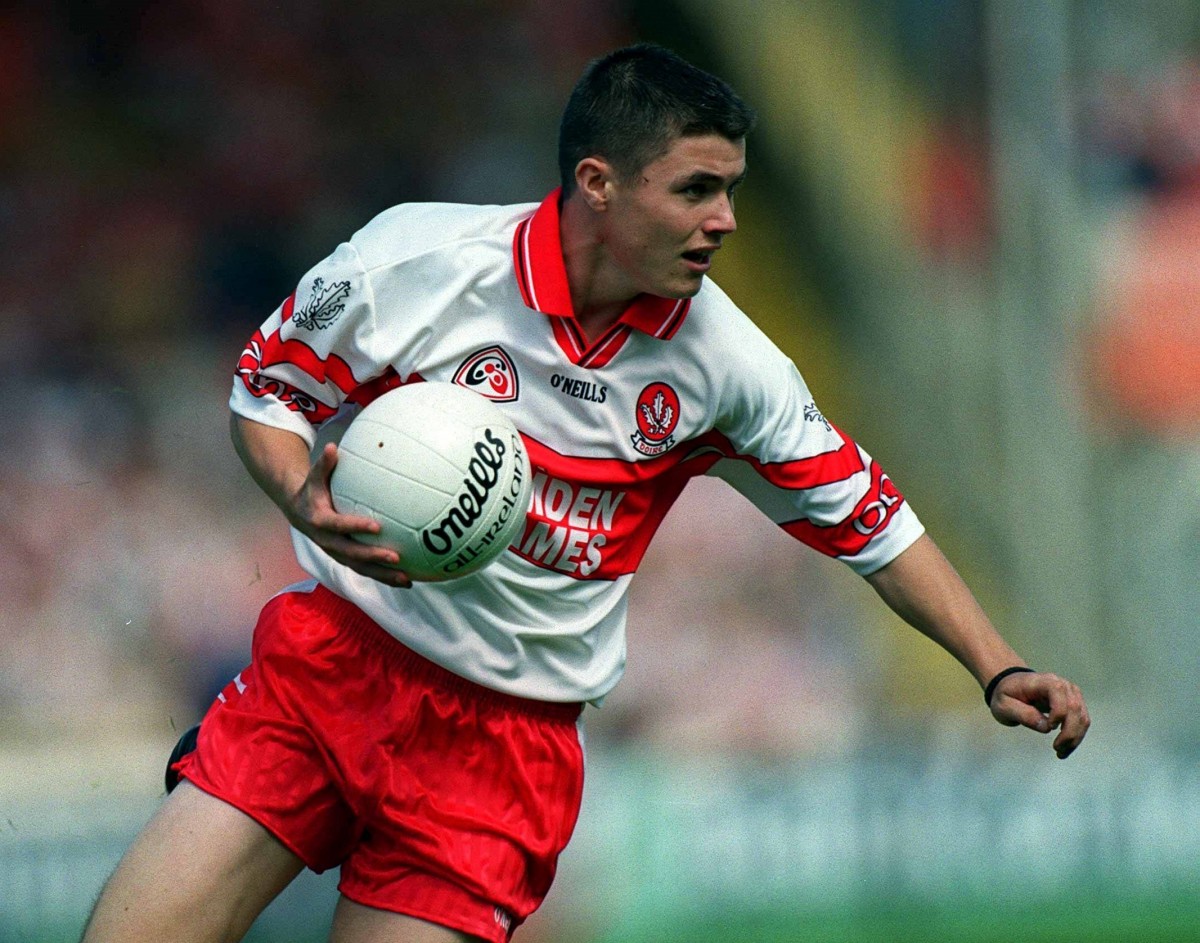
Damien Eagers/SPORTSFILE
The opportunities outside of football and the GAA are also much wider and readily available for young players, a topic Gavin Donaghy acknowledges:
“I’m still as involved in the GAA as ever I was,” he says from his Western Perth base. “Travelling hasn’t really changed my views. To be honest, it probably made me think a wee bit about things I possibly missed out on by staying at home each summer for football, but that’s just part of it all, and I wouldn’t change anything that has happened.”
An engineering degree from Queen’s University has given Donaghy currency that travels, but it was also a time during which he developed into a serious intercounty footballer which saw him play at the top of the game.
“The Queens team that I played on had a good few county players on it then and so did the teams we played so I reckon that helped a fair bit in preparing me for the step up [to senior] with regular training and games within the university set-up. At that stage the U21s and seniors were working together relatively closely with Mickey Moran over both squads so there was a few of us drafted in.”
From the Ulster minor champions of 2000, Gavin Donaghy was joined by his brother Martin, goalkeeper Brian Scullion and Slaughtneil’s Jim Kelly in progressing to adult ranks.
Following the Ulster final, manager Chris Brown also drafted in Joe Diver, a fact which the big Bellaghy man recalled in a Derry Journal interview published in 2006:
“I had been doing my A-Levels and after they were over Chris Brown brought me on board. I got five minutes as sub in the infamous game against Cork where the lad had the two yellow cards but wasn’t sent off.”
As Diver recalled correctly, two yellow cards had been issued to the Cork midfielder, Kieran Murphy, but no red card ever came. Derry had lost by a point and Cork would go on to win the final comfortably. It still rankles.
“Gutted would be an understatement,” says Gavin Donaghy, almost exactly 17 years to the day and over 9000 miles from Croke Park.
“Gerry Kinneavy’s mistake just compounded it all. In the first five minutes I had kicked two points, and then next thing I was under the stands getting my cheek stitched up! So it was a bit of a rollercoaster that day,” he explains.
In a cruel twist of fate compounded by time and distance, Donaghy isn’t ever far from the memory of what happened.
“It [the feeling] has changed but I still hold a bit of regret at not having a crack in the final. One of the lads in the Cork team that ‘beat’ us plays in the same club as me now and likes bringing it up every so often” he says.
The GAA club to which the Claudy man refers is Western Perth Shamrocks. Formed in 1988, and an example of the changing world of the GAA, it’s a natural environment for Gavin Donaghy and where he sees that ‘the GAA overseas is much the same as home’.
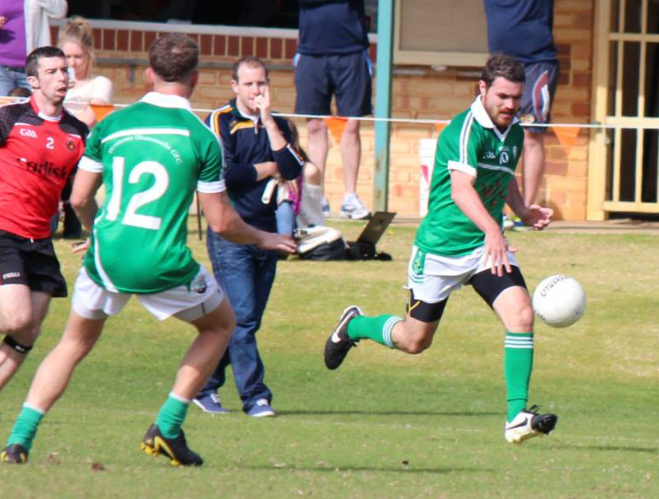
“It’s on a much smaller scale,” he admits, before telling of how the essence of the games has transplanted in a short space of time across vast ocean. Gaelic games are in the people, and truly representative of the people of Ireland, warts and all, as Donaghy outlines:
“The passion is very evident in games even though most players were born thousands of miles away and your ‘fierce rivals’ are a club barely fifteen years old. The clubs here act as a hub for the Irish which gives it a great sense of community. The effort put in by volunteers here is ridiculous, and in some cases maybe more than what you’d see from an average club at home, bearing in mind the resources that we have, or don’t have.”
Come Sunday and Croke Park time for the class of 2017, at least one part of Western Australia will be urging the Derry minors on one step further.
“I’d imagine the buzz around the panel will be brilliant,” Donaghy says knowingly. “My advice (to the lads) would be simple. Leave it all on the field. Have no regrets and just play the game. I’ve got an Ulster medal but I missed out on the chance at an All-Ireland. It’s at home sitting in a cabinet.”
Home for Donaghy will always in Claudy surrounded by the Sperrins. But the former inter-county player has also helped create and sustain a home from home for Irish ex-pats. He’s the Western Perth Shamrocks club chairman. He’s also their referee.
The All-Blacks made personal humility their cardinal value back in 2004. Seems like they weren’t alone.
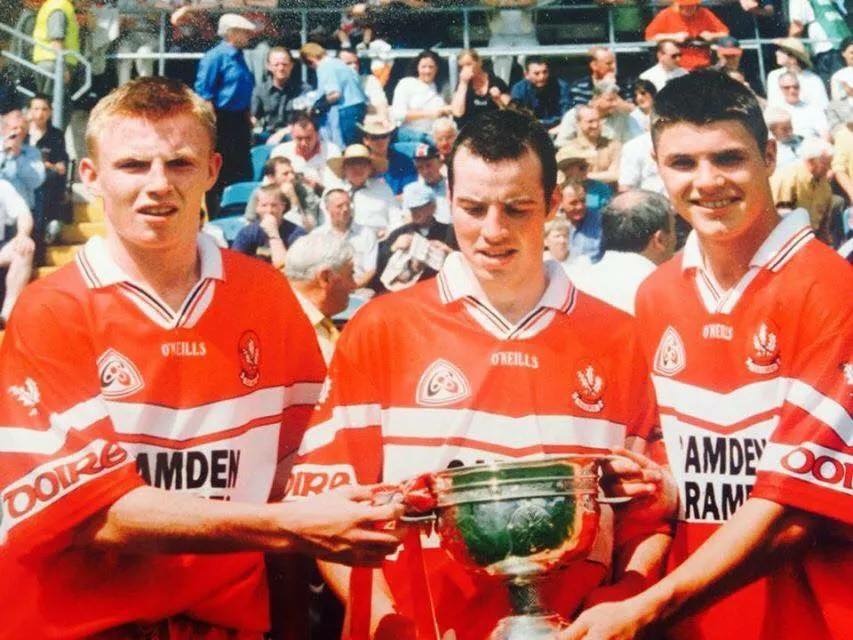
Derry Minors 2000: Brian Scullion (Bellaghy), Martin O’Kane (Castledawson), Colm Feeney (Drumsurn), Philip Mooney (Swatragh), Sean McKenna (Glen), Chris Collins (Ogra Colmcille), Gary McMaster (Glen), Kevin McCann (Greenlough), Damian Canning (Drumsurn), Gavin Donaghy (Claudy), Jim Kelly (Slaughtneil), Cormac O’Neill (Greenlough), Martin Donaghy (Claudy), Ciaran O’Neill (Glen), Paul Young (Loup), Shane McGuckin (Loup), Stephen Scullion (Ballinderry), Conan O’Brien (Magherafelt), Connor Doherty (Bellaghy), Arthur McNally (Ballinascreen), Paul Hearty (Lavey), Brian Rainey (Doire Colmcille), Barry McGuigan (Slaughtneil), Joe Diver (Bellaghy). Management: Chris Brown, Paddy Crozier, Charlie O’Kane, Bernard Henry, Aidan O’Brien.
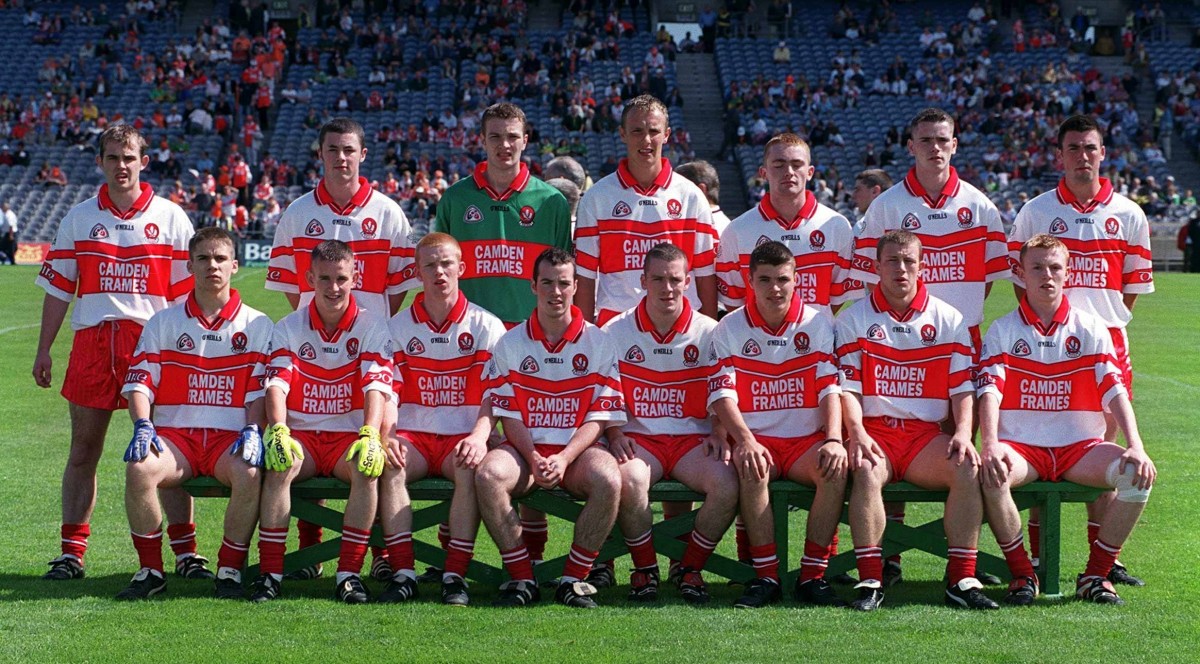
Ray McManus/SPORTSFILE
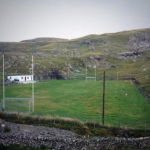
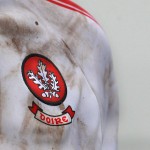
Comments